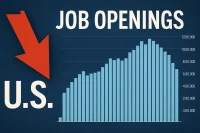South Korean auto giant Hyundai is pumping $21 billion into its US operations, just days before President Trump is expected to announce sweeping new tariffs on vehicle imports.
The investment includes:
- A $5.8 billion steel plant in Louisiana
- $9 billion to expand US vehicle production
- $6 billion for advanced technology including robotics and AI
- A $3 billion deal to purchase US liquefied natural gas
For job seekers, this move could be a game-changer. For employers and policymakers, it’s a clear sign that trade tensions are influencing global business decisions.
Key Highlights: What’s in the Hyundai Deal?
Hyundai’s new steel facility will:
- Produce over 2.7 million metric tons of steel annually
- Support its factories in Alabama and Georgia
- Create 1,400+ jobs in a high-value manufacturing sector
Steelmaking jobs tend to be well-paid and offer long-term stability. This plant could also revive local supply chains and benefit surrounding businesses.
U.S. Vehicle Production Gets a Boost
The company plans to scale up American manufacturing, aiming to hit 1.2 million vehicles per year by 2028. This includes:
- Increased production at its existing Alabama plant
- New capacity from the upcoming $7.59 billion EV and battery factory in Georgia
- Continued operations at the Kia plant in Georgia
Together, these sites will have the capacity to produce nearly 1 million vehicles annually.
For skilled trades and engineering professionals, this expansion opens doors—from assembly line roles to plant management and logistics.

A Push Into AI and Autonomous Driving
Hyundai will also spend $6 billion partnering with US firms on:
- Self-driving vehicle technology
- Robotics and automation
- Artificial Intelligence (AI) research
These investments point to growing demand for software engineers, machine learning specialists, and robotics technicians.
Employers in the tech space should watch this closely—Hyundai’s presence could tighten competition for talent in these fields.
Trade Tariffs: The Political Backdrop
President Trump called the investment “a clear demonstration that tariffs very strongly work.”
His administration is preparing to:
- Announce new import tariffs on vehicle-related products
- Enforce reciprocal tariffs from April 2
- Maintain a 25% tax on imported steel and aluminum
South Korea, Hyundai’s home base, could be targeted due to its large trade surplus with the U.S. These developments are pressuring global companies to shift more production stateside to avoid future tariffs.
So What Does This Mean for Job Seekers?
- Manufacturing roles are returning—but with a tech twist. Expect hybrid roles that combine mechanical skills with digital knowledge.
- Location matters. Southern states like Georgia, Alabama, and Louisiana are becoming new hubs for advanced manufacturing and green energy.
- Upskilling is key. Jobs in these new plants won’t just be about physical labor—they’ll require training in automation, data handling, and smart systems.
What Employers Should Know
Hiring managers in the automotive and industrial sectors may soon face:
- Increased competition for skilled labor as Hyundai ramps up hiring
- Opportunities to partner with Hyundai in areas like logistics, construction, and local tech development
- Higher wage pressure in regions where Hyundai is expanding due to increased demand for experienced workers
Companies in the supply chain—such as parts manufacturers or logistics firms—should prepare to scale up alongside Hyundai.
Looking Ahead: More Than Just Cars
Hyundai’s strategy goes beyond building vehicles. It’s laying down roots in the U.S. economy—across energy, automation, and infrastructure.
While some of the investments were previously announced, their scale and timing send a clear message: global manufacturers are adapting fast to the new economic climate.




